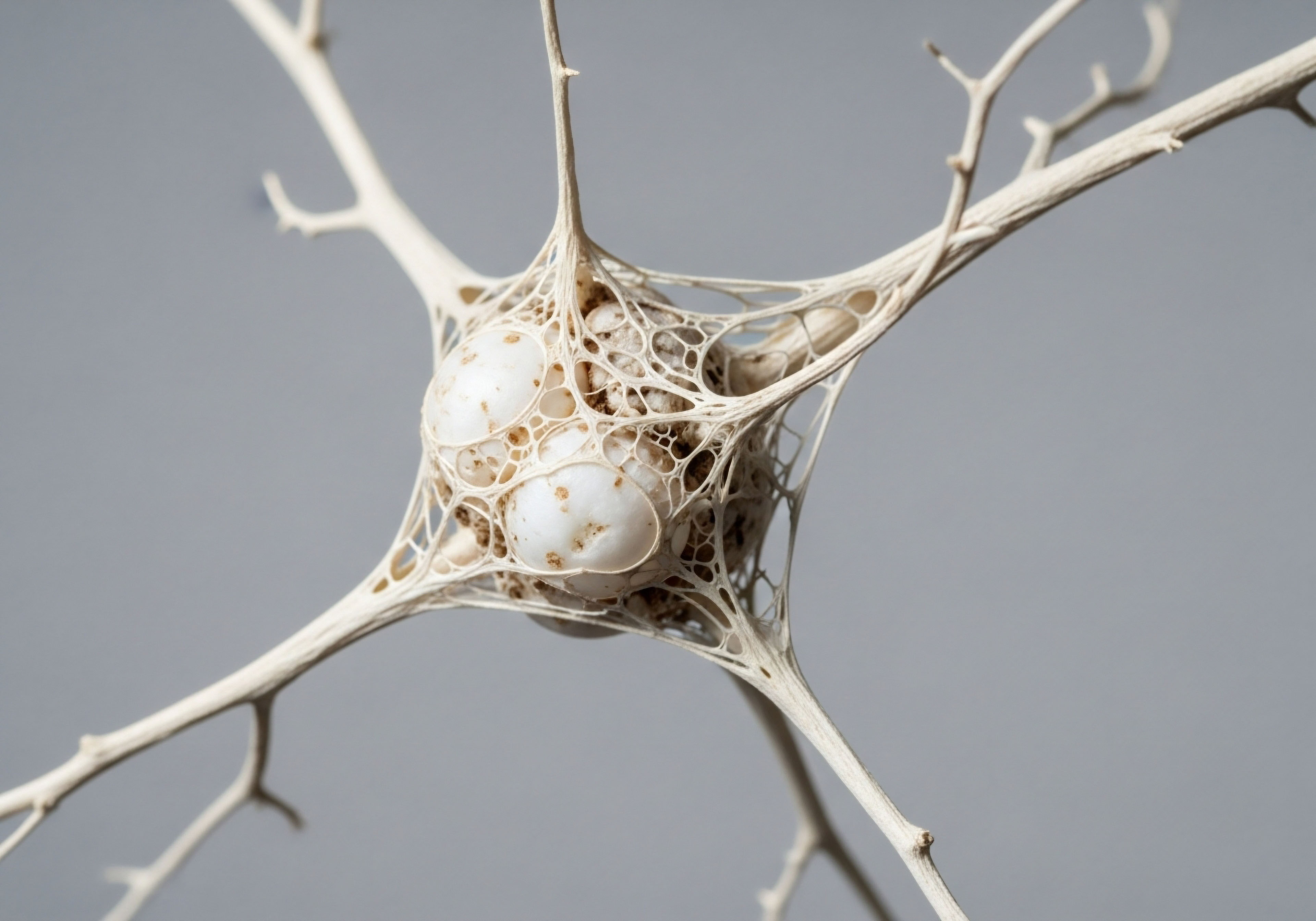

Fundamentals
The feeling of mental fog, the frustrating search for a word that was just on the tip of your tongue, or a subtle shift in your emotional baseline can be deeply unsettling. These experiences are often dismissed as inevitable consequences of stress or aging.
The reality is that your cognitive clarity and emotional state are intimately tied to the complex, silent language of your endocrine system. Hormones are the body’s internal messaging service, a sophisticated network of molecules that dictates function across every biological system, including the very architecture of your thoughts and feelings. Understanding this connection is the first step toward reclaiming your mental and emotional vitality.
Your brain is a profoundly sensitive hormonal organ, rich with receptors for signals like testosterone, estrogen, and thyroid hormones. These molecules are not merely accessories to brain function; they are fundamental to it. They support neuroprotection, which is the brain’s ability to defend itself against injury and degeneration.
They also modulate synaptic plasticity, the very process that allows you to learn, adapt, and form memories. When these hormonal signals become diminished or imbalanced, the brain’s operational capacity can be compromised. This can manifest as difficulty concentrating, memory lapses, or a pervasive sense of anxiety or low mood that you can’t quite explain. These are not personal failings. They are physiological signals that merit investigation.
The intricate dance between your hormones and your brain dictates much of your daily cognitive experience and emotional resilience.

The Endocrine System and the Brain
The endocrine system communicates through complex feedback loops, with the brain acting as the central command. The hypothalamic-pituitary-gonadal (HPG) axis, for instance, is a continuous conversation between the brain and the reproductive organs. In men, this axis governs testosterone production. In women, it orchestrates the menstrual cycle and the production of estrogen and progesterone.
A disruption anywhere along this axis can have cascading effects that reach far beyond reproductive health, directly impacting cognitive processes and emotional regulation. For many, the subtle decline in these key hormones during andropause or menopause marks a noticeable shift in mental sharpness and well-being.
Hormonal influence extends to the very structure and energy supply of the brain. Estrogen, for example, plays a significant role in cerebral blood flow and glucose metabolism, ensuring that brain cells have the fuel they need to function optimally.
Testosterone has been shown to have neuroprotective effects, helping to shield neurons from the inflammatory and oxidative stress that contributes to age-related cognitive decline. When these hormonal supports weaken, the brain’s resilience is diminished, making it more susceptible to the cognitive and emotional challenges that many people experience as they age.

What Are the Initial Signs of Hormonal Influence on Cognition?
The initial signs of hormonal influence on cognitive function are often subtle and easily attributed to other life stressors. Recognizing these early patterns is a crucial step in understanding the underlying biological shifts that may be occurring. These signs can differ between men and women, reflecting the distinct hormonal changes each experiences.

For Women
During perimenopause and menopause, the fluctuating and eventual decline of estrogen and progesterone can lead to a specific constellation of cognitive and mood symptoms. Many women report a distinct “brain fog,” a subjective sense of mental cloudiness that makes concentration difficult. Short-term memory lapses, such as misplacing keys or forgetting appointments, become more frequent.
Verbal fluency can also be affected, leading to those frustrating moments of being unable to recall a specific word. Alongside these cognitive shifts, changes in mood are common, including increased irritability, anxiety, and the onset of depressive feelings that may be entirely new to the individual.

For Men
In men, the gradual decline of testosterone associated with andropause can manifest as a different set of cognitive and emotional changes. A primary symptom is often a decline in motivation and drive, which can be mistaken for a lack of ambition or simple fatigue.
Men may notice a decrease in their spatial reasoning abilities or find that complex problem-solving takes more effort than it used to. Memory and focus can also be impacted, leading to difficulties in work performance or daily tasks. Emotionally, low testosterone is frequently linked to a flattened mood, increased irritability, and a general loss of a sense of well-being.


Intermediate
Understanding that hormonal fluctuations impact cognition is the first step. The next is to explore the specific mechanisms and clinical protocols designed to address these changes. Hormonal optimization is a process of recalibrating the body’s internal messaging system to restore function.
This involves moving beyond a generalized understanding of hormones and looking at the precise roles of key players like testosterone, estrogen, and progesterone, and how their levels can be systematically and safely managed to support cognitive and emotional well-being.
The clinical approach to hormonal intervention is grounded in data. It begins with a comprehensive analysis of blood markers to create a detailed map of an individual’s unique endocrine landscape. This is followed by the implementation of targeted therapeutic protocols designed to restore hormonal parameters to an optimal range.
These protocols are not a one-size-fits-all solution. They are highly personalized, taking into account an individual’s specific symptoms, lab results, age, and overall health profile. The goal is to re-establish the physiological environment in which the brain can thrive.
Targeted hormonal therapies are designed to restore the specific biochemical signals your brain relies on for optimal performance and mood regulation.

Hormone Replacement Protocols for Cognitive and Emotional Health
Hormone replacement therapy (HRT) protocols are tailored to the distinct physiological needs of men and women. While the overarching goal of cognitive and emotional support is the same, the specific agents and strategies employed differ significantly.

Testosterone Replacement Therapy for Men
For middle-aged and older men experiencing the cognitive and mood symptoms of low testosterone, Testosterone Replacement Therapy (TRT) is a primary intervention. The standard protocol often involves weekly intramuscular injections of Testosterone Cypionate. This method provides a stable and predictable elevation of testosterone levels, avoiding the peaks and troughs that can occur with other delivery methods.
- Gonadorelin ∞ This is often included in a TRT protocol to maintain the function of the hypothalamic-pituitary-gonadal axis. By mimicking the action of gonadotropin-releasing hormone (GnRH), Gonadorelin stimulates the pituitary to produce luteinizing hormone (LH) and follicle-stimulating hormone (FSH), which in turn signals the testes to continue their natural testosterone production. This helps to preserve testicular size and function.
- Anastrozole ∞ Testosterone can be converted into estrogen in the male body through a process called aromatization. While some estrogen is necessary for male health, excess levels can lead to side effects. Anastrozole is an aromatase inhibitor, an oral medication taken to block this conversion, thereby maintaining a balanced testosterone-to-estrogen ratio.
- Enclomiphene ∞ This may be used as an alternative or adjunct to Gonadorelin to support LH and FSH levels, further promoting the body’s own testosterone production.
Studies have shown that TRT can lead to improvements in several cognitive domains, including spatial memory and executive function. Men undergoing TRT have also reported reductions in depressive symptoms and an overall improvement in mood and motivation.

Hormone Therapy for Women
For women in the perimenopausal and postmenopausal stages, hormone therapy is designed to address the decline in estrogen and progesterone, and in some cases, testosterone. The goal is to alleviate the cognitive symptoms of brain fog and memory loss, as well as the mood changes associated with this life stage.
| Hormone | Typical Protocol | Primary Cognitive and Mood Benefits |
|---|---|---|
| Testosterone Cypionate | Low-dose weekly subcutaneous injections (e.g. 10-20 units) | Improved mental clarity, focus, and libido; may also enhance mood and energy levels. |
| Progesterone | Prescribed based on menopausal status (e.g. cyclic or continuous oral administration) | Promotes calming and sleep, which indirectly supports cognitive function; helps to balance the effects of estrogen. |
| Estrogen | Transdermal patches or gels are often preferred for their safety profile. | Alleviates vasomotor symptoms (hot flashes) which can disrupt sleep and cognition; supports cerebral blood flow and neuronal health. |

How Do Peptides Support Cognitive Function?
Peptide therapies represent a more targeted approach to supporting cognitive and overall health. Peptides are short chains of amino acids that act as signaling molecules in the body. Certain peptides are used to stimulate the body’s own production of growth hormone (GH), which can have significant downstream effects on brain health.
Growth hormone peptide therapies, such as Sermorelin and Ipamorelin/CJC-1295, work by stimulating the pituitary gland to release GH. Unlike direct GH injections, this approach preserves the body’s natural feedback loops, leading to a more physiological release of growth hormone. Increased GH levels can enhance sleep quality, which is fundamentally important for memory consolidation and cognitive restoration. Furthermore, GH supports cellular repair processes throughout the body, including in the brain.


Academic
A sophisticated examination of hormonal influence on cognitive function requires a deep dive into the molecular and systemic interactions that govern neurophysiology. The brain is not merely a passive recipient of hormonal signals; it is an active participant in a dynamic biochemical dialogue.
The cognitive and affective sequelae of hormonal decline are the clinical manifestations of intricate changes in neuro-transmitter systems, neuro-inflammation, and cellular bioenergetics. Understanding these mechanisms is essential for appreciating the full therapeutic potential of hormonal interventions.
The scientific literature provides a complex and sometimes conflicting picture of the relationship between hormonal therapies and cognition. Early observational studies often pointed to significant cognitive benefits of estrogen therapy in postmenopausal women, while some large-scale randomized controlled trials, such as the Women’s Health Initiative Memory Study (WHIMS), produced more equivocal or even negative results.
This highlights the critical importance of timing, formulation, and individual patient characteristics in determining outcomes. The “critical window” hypothesis, for instance, posits that the neuroprotective benefits of estrogen therapy are most pronounced when initiated close to the onset of menopause. Similarly, in men, while many studies show a positive correlation between testosterone and cognitive domains like spatial memory, others have found no significant effect. These discrepancies underscore the need for a personalized, systems-based approach to hormonal optimization.
The efficacy of hormonal interventions on cognition is a function of intricate variables including the timing of initiation, the specific molecular formulation, and the baseline neurophysiological state of the individual.

The Neurobiology of Hormonal Action on the Brain
Hormones exert their influence on the brain through a variety of genomic and non-genomic pathways. Steroid hormones like testosterone and estrogen are lipid-soluble and can cross the blood-brain barrier to bind with intracellular receptors.
This hormone-receptor complex then translocates to the cell nucleus, where it acts as a transcription factor, modulating the expression of genes involved in neuronal survival, synaptic plasticity, and neurotransmitter synthesis. For example, estrogen has been shown to upregulate the production of brain-derived neurotrophic factor (BDNF), a key molecule for neurogenesis and synaptic health.
Beyond these genomic effects, hormones can also act rapidly through membrane-bound receptors to influence neuronal excitability and signaling cascades. These non-genomic actions can modulate neurotransmitter systems, such as the cholinergic, serotonergic, and dopaminergic pathways, which are all fundamental to attention, mood, and memory. The decline in estrogen during menopause, for instance, is associated with a reduction in cholinergic activity, which may contribute to the memory complaints common in this population.
| Hormone | Primary Brain Regions of Action | Key Neurobiological Effects | Associated Cognitive Functions |
|---|---|---|---|
| Estrogen | Hippocampus, Prefrontal Cortex | Upregulates BDNF, enhances synaptic plasticity, supports cerebral blood flow and glucose metabolism. | Verbal memory, working memory, executive function. |
| Testosterone | Hippocampus, Amygdala | Neuroprotective effects, reduces amyloid-beta accumulation, modulates dopaminergic pathways. | Spatial memory, executive function, processing speed. |
| Progesterone | Cerebral Cortex, Hippocampus | Metabolizes to allopregnanolone, a potent positive allosteric modulator of GABA-A receptors. | Promotes calming and sleep, reduces anxiety. |

Can Hormonal Decline Accelerate Neurodegenerative Processes?
A growing body of research is investigating the link between age-related hormonal decline and the risk of neurodegenerative diseases like Alzheimer’s. The evidence suggests that the loss of hormonal support may leave the brain more vulnerable to the pathological processes that characterize these conditions.
For example, preclinical and observational studies have indicated that testosterone plays a role in clearing amyloid-beta plaques, the hallmark pathology of Alzheimer’s disease. Low testosterone levels in men have been correlated with higher amyloid-beta accumulation and an increased risk of cognitive decline.
Similarly, estrogen’s role in supporting neuronal health and combating oxidative stress suggests that its decline could be a contributing factor to neurodegenerative risk in women. The timing of hormone therapy appears to be a critical variable. The “critical window” hypothesis suggests that initiating estrogen therapy near the time of menopause may confer a neuroprotective benefit, potentially reducing the long-term risk of dementia.
However, initiating therapy many years after menopause may not have the same protective effect and, in some cases, could be detrimental. This underscores the complexity of hormonal interventions and the need for a nuanced, individualized approach grounded in a deep understanding of neuroendocrine science.
- Amyloid-Beta Clearance ∞ Testosterone has been shown in some studies to modulate the enzymes responsible for the production and clearance of amyloid-beta peptides.
- Anti-Inflammatory Effects ∞ Both estrogen and testosterone have anti-inflammatory properties within the brain, helping to quell the chronic neuroinflammation that is a key driver of neurodegenerative diseases.
- Mitochondrial Support ∞ Hormones support mitochondrial function, the cellular powerhouses that provide the energy neurons need to survive and function. Hormonal decline can lead to mitochondrial dysfunction, a common feature of neurodegenerative conditions.

References
- Toffol, E. Heikinheimo, O. & Partonen, T. (2016). Hormone therapy and mood in perimenopausal and postmenopausal women ∞ a narrative review. Menopause, 23(5), 564-578.
- Maki, P. M. & Henderson, V. W. (2016). Hormone therapy, dementia, and cognition ∞ the Women’s Health Initiative Memory Study. The Lancet Neurology, 15(3), 312-322.
- Henderson, V. W. (2014). The critical window for hormone therapy and cognitive aging. JAMA Neurology, 71(2), 143-144.
- Barron, A. M. & Pike, C. J. (2012). Sex hormones, aging, and the brain. Endocrinology, 153(6), 2579-2586.
- Resnick, S. M. Henderson, V. W. & Maki, P. M. (2017). The Women’s Health Initiative Memory Study ∞ findings and implications for clinical practice. Journal of the American Geriatrics Society, 65(7), 1385-1392.
- Cherrier, M. M. Asthana, S. Plymate, S. Matsumoto, A. M. & Craft, S. (2001). Testosterone supplementation improves spatial and verbal memory in healthy older men. Neurology, 57(1), 80-88.
- Holland, J. Bandelow, S. & Hogervorst, E. (2011). Testosterone and cognitive function in men ∞ a review. Journal of Endocrinological Investigation, 34(7), 545-557.
- Salpeter, S. R. Walsh, J. M. E. Ormiston, T. M. Greyber, E. Buckley, N. S. & Salpeter, E. E. (2006). Meta-analysis ∞ effect of hormone-replacement therapy on components of the metabolic syndrome in postmenopausal women. Diabetes, Obesity and Metabolism, 8(5), 538-554.
- Rosario, E. R. Chang, L. Stanczyk, F. Z. & Pike, C. J. (2011). Age-related testosterone depletion and the development of Alzheimer’s disease. JAMA Neurology, 68(10), 1293-1299.
- Resnick, S. M. Matsumoto, A. M. Stephens-Shields, A. J. Ellenberg, S. S. Gill, T. M. Shumaker, S. A. & Snyder, P. J. (2017). Testosterone treatment and cognitive function in older men with low testosterone and age-associated memory impairment. JAMA, 317(7), 717-727.

Reflection
The information presented here offers a window into the intricate biological systems that shape your cognitive and emotional world. It provides a framework for understanding why you feel the way you do, connecting subjective experience to objective physiological data. This knowledge is the foundational tool for transforming your health narrative.
The path forward involves a partnership, a data-driven exploration of your own unique biology. Your personal health journey is a process of continuous learning and refinement, moving toward a state of optimized function and sustained vitality. The potential to recalibrate your system and reclaim your mental clarity is within the scope of modern clinical science.

Glossary

neuroprotection

synaptic plasticity

estrogen and progesterone

andropause

cerebral blood flow

hormonal influence

cognitive function

perimenopause

low testosterone

testosterone replacement therapy

trt

hypothalamic-pituitary-gonadal axis

gonadorelin

anastrozole

hormone therapy

sermorelin

hormonal interventions

hormonal decline

health initiative memory study

estrogen therapy




